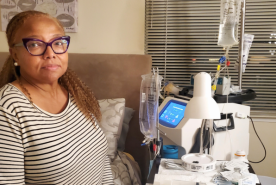Last Updated: February 21, 2025
Medically reviewed by NKF Patient Education Team
About Pain Medicines and Kidney Disease
Everybody experiences pain. Sometimes it only lasts a short while. Other times, it can last for weeks, months, or longer. In either case, if your pain interferes with your daily routine, your healthcare professional may recommend pain medicine as part of your treatment plan.
For people living with chronic kidney disease (CKD), finding the right treatment for your pain can be hard. This is because some pain medicines can harm your kidneys. Also, many pain medicines leave your body through the kidneys. So, they can build up in more advanced stages of CKD.
Uses
Pain medicines are used for many different types of pain. The type of pain medicine recommended for you will depend on the type of pain you have. Two ways to think about types of pain include its duration (how long the pain lasts or is expected to last) and its cause.
Pain duration (how long the pain lasts)
- Acute pain – pain that does not last very long (usually no more than a few hours or days). It often begins suddenly and has a specific cause, like an injury, surgery, or illness. This pain usually goes away once the cause is treated or healed.
- Chronic pain – pain that appears every day or most days and lasts longer than 3 months. This pain is usually caused by another health condition, like arthritis, neuropathy (nerve damage), sickle cell disease, chronic migraines, cancer, or serious accident or injury.
Common causes of pain
- Damage to tissue or bone, like a fracture or burn.
- Nerve damage or dysfunction, also known as neuropathy.
- Inflammation (swelling of blood vessels), either limited to one body part or throughout the body.
- Cancer pain, caused by a growing tumor, compressed nerves, or side effects of treatment.
Types
Many different types of pain medicine are available. Some are available “over the counter” or OTC, which means you can buy them without a prescription. Others are only available with a prescription from your healthcare professional.
Common types of over the counter (OTC) pain medicines include:
- acetaminophen (Tylenol)
- non-steroidal anti-inflammatory drugs (NSAIDs), such as ibuprofen (Advil, Motrin), naproxen (Aleve), diclofenac topical gel (Voltaren), and high-dose aspirin (more than 325 mg per day)
- other topical (applied to your skin) pain relievers, such as capsaicin, menthol, camphor, salicylates, and lidocaine. These are often sold as creams, patches, or gels. Many products contain a mix of these ingredients. Common brand names include Icy Hot, Bengay, Biofreeze, Salonpas, Aspercreme, and Zostrix.
Common types of prescription pain medicines include:
- non-steroidal anti-inflammatory drugs (NSAIDs), such as celecoxib (Celebrex), diclofenac tablets or capsules (Cataflam, Zipsor), indomethacin (Indocin), ketorolac (Toradol), meloxicam (Mobic), and higher doses of ibuprofen (Advil, Motrin) and naproxen (Aleve, Naprosyn)
- antidepressants, such as amitriptyline, duloxetine (Cymbalta), milnacipran (Savella), nortriptyline, and venlafaxine (Effexor)
- anti-seizure medicines, such as carbamazepine (Tegretol), gabapentin (Neurontin, Gralise), pregabalin (Lyrica), and topiramate (Topamax)
- corticosteroids (sometimes referred to as “steroids”), such as prednisone, methylprednisolone (Medrol), dexamethasone (Decadron), or triamcinolone injection (Kenalog)
- short-acting opioids, such as codeine (Tylenol #3), hydrocodone (Vicodin, Norco), hydromorphone (Dilaudid), meperidine (Demerol), morphine, oxycodone (Roxicodone, Percocet), oxymorphone (Opana), and tramadol (Ultram)
- long-acting opioids, such as buprenorphine (Butrans, Belbuca), fentanyl patch (Duragesic), methadone, and extended-release versions of hydromorphone (Exalgo), hydrocodone (Zohydro ER), morphine (MS Contin, Kadian), and oxycodone (OxyContin)
- non-opioid pain signal blocker, such as suzetrigine (Journavx)
All of these medicines come with risks. So, an important treatment goal is to use the lowest dose of medicine for the shortest amount of time necessary to help treat the cause of your pain.
Effectiveness
The most effective pain medicine for you depends on the type, cause, location, and duration of your pain. Sometimes a combination of different medicines can offer maximal benefits while reducing risks. It is also possible for people to respond differently to pain medicines. What works for one person may not work for somebody else. So, sometimes multiple medicines may need to be tried before a solution is found.
For most types of pain, treatment is more effective when it includes treatments that are not medications, like stretching, yoga, physical therapy, acupuncture/acupressure, aromatherapy, meditation, massage, and/or tai chi.
Safety
It is always important to compare the benefits of any medicine against its risks. Your healthcare professional will likely consider factors like the health of your kidneys and/or liver, other medicines you are taking, your other health conditions, and any potential side effects, when deciding which option(s) may be best for you. A summary of the kidney-related safety concerns for each group of pain medicines is available below.
Acetaminophen (Tylenol)
In general, acetaminophen is safe for your kidneys at recommended doses. But check with your healthcare professional first to determine the cause of your pain and the best way to treat it. Also, acetaminophen is often mixed with other ingredients in a lot of products sold over the counter (like cough & cold medicines). So, pay close attention to ingredient labels when buying a product. If you don’t pay close attention to labels, it can be very easy to take too much acetaminophen by accident.
Acetaminophen can make liver disease worse. So, people with liver disease should check with their healthcare professional before using acetaminophen to know whether it is safe for you to take (and if so, how much). It is not likely to cause liver damage in people without liver disease when used at recommended doses.
Non-steroidal anti-inflammatory drugs (NSAIDs)
NSAIDs lower the amount of blood that flows through your kidneys. So, they can lead to acute kidney injury (AKI) and/or worsening CKD, especially at higher doses and/or with long-term use. People with CKD should avoid NSAIDs, especially if your estimated glomerular filtration rate (eGFR) is lower than 60. NSAIDs should also be avoided by people who have liver disease, heart disease, heart failure, high blood pressure, or who are taking high blood pressure medicines (including ACE inhibitors/ARBs or diuretics).
Sometimes it may not be possible to avoid using NSAIDs depending on your other health conditions. In these situations, be sure to closely follow your healthcare professional’s directions.
To reduce the risk of kidney damage, NSAIDs should only be used:
- As recommended on the product labeling (only if you do not have CKD; people with CKD should not self-treat with NSAIDs – talk with a healthcare professional first!)
- As prescribed/recommended by your healthcare professional
- At the lowest dose possible
- For the shortest duration necessary
One type of NSAID product that can be safe to use with CKD is the topical form (applied directly to skin). For example, diclofenac gel (Voltaren) is rubbed directly into your joints. This helps lower the risk of kidney damage because very little drug enters your blood.
Many NSAIDs are available over the counter and often mixed with other ingredients (like cough & cold medicines). So, always check the product labeling for the word “NSAID” and ask your healthcare professional before using any of these products.
Topical (applied to skin) pain relievers
When used according to product labeling, topical pain relievers are not expected to have any kidney-related safety concerns. Be careful not to apply more medication than recommended - this can lead to higher amounts of drug getting into your blood and reaching your kidneys.
Antidepressants and anti-seizure medicines
These medicines usually do not harm your kidneys. But many are removed from your body by the kidneys. For people living with CKD, this means the dose may need to be adjusted based on your eGFR. As your eGFR goes down, you may be advised to lower your dose and/or take the medicine less often (for example, every 12 hours instead of every 4 hours). So, it is important to have your eGFR checked regularly to help make sure your dose is still appropriate for you.
Corticosteroids
Corticosteroids can cause side effects like fluid retention (buildup of water in your body), increased blood pressure, and increased blood sugar. All of these can place extra stress on your kidneys. The actual risk of these side effects depends on the steroid used, the dose given, how long you need the steroid, and how it is given. For example, a steroid injection given directly in the knee will cause fewer side effects than a high-dose steroid burst given by mouth for an arthritis or lupus flare-up.
Opioids
Opioids usually do not harm your kidneys. But many opioids are removed from your body by the kidneys. Some also have byproducts that are removed through your kidneys – including codeine, hydromorphone, meperidine, morphine, oxycodone, and tramadol. For people living with CKD, this means the dose of your medicine may need to be adjusted based on your eGFR. As your eGFR goes down, you may be advised to lower your dose and/or take the medicine less often (for example, every 12 hours instead of every 4 hours). Otherwise, the medicine can build up in your blood, increasing your risk of side effects or even overdose. So, it is important to have your eGFR checked regularly to help make sure your dose is appropriate for you.
Non-opioid pain signal blocker
When used according to product labeling, this medicine is not expected to have any kidney-related safety concerns. The dose does not need to be adjusted based on your eGFR. People who are on dialysis or have an eGFR of 15 or less should not use this medicine.
One day, no one’s life will be lost to kidney disease.
- Equip patients and families with knowledge, resources, and access to high-quality care.
- Advocate for policies that address disparities and prioritize kidney health for all.
- Fund research and technology to advance early detection, improve treatment, and expand transplant access.
Additional considerations
Avoid alcohol use
It is important to avoid using alcohol when taking pain medications. The combination can lead to dangerous interactions and health concerns. These include liver damage (especially with acetaminophen), acute kidney injury (especially with NSAIDs), and dizziness, tiredness, and falls (especially with antidepressants, anti-seizure medicines, and opioids).
Aspirin and kidney disease
Your healthcare professional may recommend low-dose aspirin (81-100 mg per day) if you have a history of heart disease or a very high risk of heart disease. This helps prevent future heart attacks without worsening kidney disease. When aspirin is used at higher doses (more than 325 mg per day), it acts like an NSAID on your kidneys. This means it lowers the amount of blood that flows through your kidneys. It also increases the risk of severe bleeding. So, aspirin is no longer recommended as a treatment option for pain since many safer options are readily available.
Aspirin should also be avoided in anyone under 19 years of age because of the increased risk of Reye’s Syndrome (a dangerous condition that can cause permanent brain damage or death).
Questions for your healthcare team
- Is this pain medicine safe for me to use with my kidney disease?
- Sometimes pain is treated as a stand-alone issue, without considering your other health conditions or medications you are taking. So, asking this question can help make sure your healthcare team is providing you with holistic care.
- If this pain medicine has a risk of harming my kidneys, what can I do to lower my risk?
- It is not always possible to avoid using certain pain medicines like NSAIDs. In these situations, it is important to maximize safety while minimizing risk. The best approach is different for each person, so having this conversation with your healthcare team can help ensure you get personalized advice.
- Should the dose of my pain medicine(s) be adjusted for my kidney function (eGFR)?
- Many medicines used for pain are removed from your body through your kidneys. So, asking this question can help ensure your healthcare professional matches your dose(s) to your eGFR level regularly, especially if you are on long-term pain medicine.
- What side effects should I watch out for with this pain medicine? What should I do if I experience any?
- Each pain medicine has different side effects, and each person has a different level of risk. So, asking this question will help ensure you get recommendations that are customized to your situation.
- What other treatment options can you recommend for my pain, beyond pain medicine?
- For many types of pain, a combination of medicine and non-medicine treatment options can be helpful. Sometimes non-medicine treatment can do the job entirely on its own without the need for medicine.








